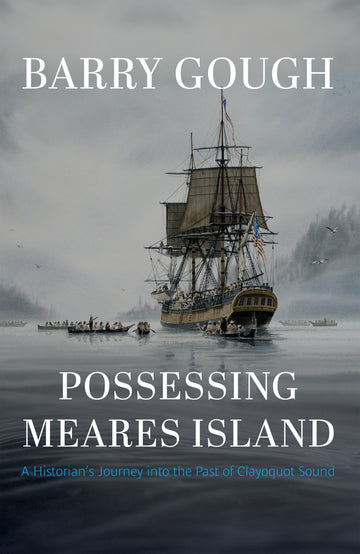Dave Flawse
Harbour Publishing
ISBN: 9781550179576
Hardback
6 in x 9 in – 256 pp
Publication Date: 13/11/2021
In a meditative, essay-style narrative, Barry Gough’s Possessing Meares Island guides the reader from the island’s murky origins to a court case of David and Goliath proportions.
The book is part memoir and part chronicle of Vancouver Island’s West Coast: “an analysis of how Meares Island came out of the mists of time, how the sea otter was hunted to the brink of extinction, how the last internecine war of 1855 changed that world, how colonial and Canadian law and regulation spread enveloping arms over Clayoquot Sound, subverting or destroying local mores, and how, at the climax of the modern age, the chainsaw and clear-cut logging threatened Meares Island.”
If this piques your interest, you won’t be disappointed—Gough’s detailed history delivers on all accounts.
While some history texts can be dry, Gough’s book finds enough story to keep the reader engaged in characters like Wickaninnish and Gough’s personal account of why he conducted the research and where that led him.
Barry Gough is one of Canada’s foremost historians and has been writing for almost four decades. He has received awards and prizes for his writing in Canada, the UK, USA, and Spain.
In the 1980s, one of his early books caught the attention of a lawyer who asked Gough to conduct research for a case which would eventually become some of the material for this book.
The court case was between the world’s biggest logging company, Macmillan Bloedel (MacBlo) who had a licence to clear cut Meares Island, and the Nuu-Chah-Nulth Tribal Council (NTC), a small West Coast First Nation, who wished to see the island left alone.
The case hinged on Aboriginal title, and Gough had to prove “Meares Island had not been abandoned by Indigenous Peoples” since the time of European contact.
Gough devotes two-thirds of the book to Part I, The Empire of Fortunes where he focuses mainly on the time around the sea otter trade. Part II, War of the Woods is where we see the court case come into focus.
As MacBlo’s flotilla of machines and falling crews motored out to Meares Island, a group led by Moses Martin canoed out to meet them and claimed the island as their garden (an important legal act), triggering what would be one of the most important cases for protection of old growth forests and “the fist combined victory against the logging industry’s political and industrial juggernaut.”
Gough’s work on the case was a key part of an injunction to stop logging the island. “And there this matter rests to this day, with roll-over or extended injunctions.”
Early in the book Barry Gough notes, “The history of Meares Island is not the history of Vancouver Island, anymore than the history of Vancouver Island is the history of British Columbia.”
That statement is true, at least until a logging road was punched through to the west coast in 1959, disrupting its isolated and unique history.
It’s a history that is hard for Gough to access because he only has half the story—the European perspective, gleaned partly from European and American ship reports from the late eighteenth and early nineteenth centuries.
The Indigenous perspective existed but in limited oral stories. “Of all the challenges the historian faces,” says Gough, “this is the most formidable.”
The book’s cover depicts a scene that emerges a few times in the narrative—Indigenous canoers approaching a high-masted sailing ship anchored in misty bay. After reading the book you realise the nuances in this interaction—who is standing in the canoe, why the ship has an American flag—and it brings an entirely new appreciation for the striking image.
Likewise, you will have a new appreciation for Vancouver Island’s west coast and, thanks to the work from the NTC and conservationists, an appreciation for its raw landscape, only lightly touched by human hands.
For $36.95, this hardcover is one to share with your reader friends and family. It’s one for the bookshelf, cover facing out.
